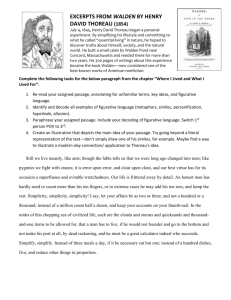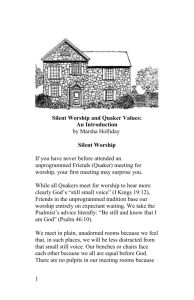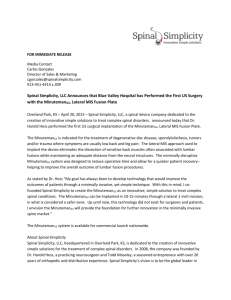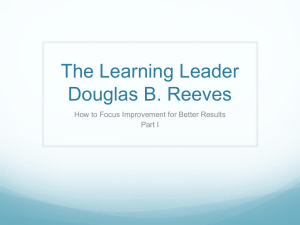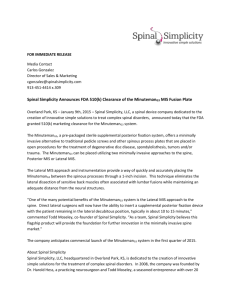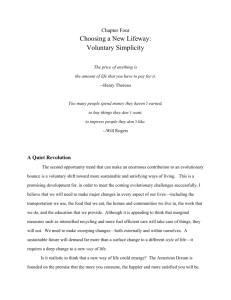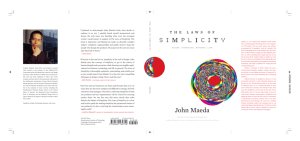Quotes — Simplicity of Heart (Contentment)
advertisement
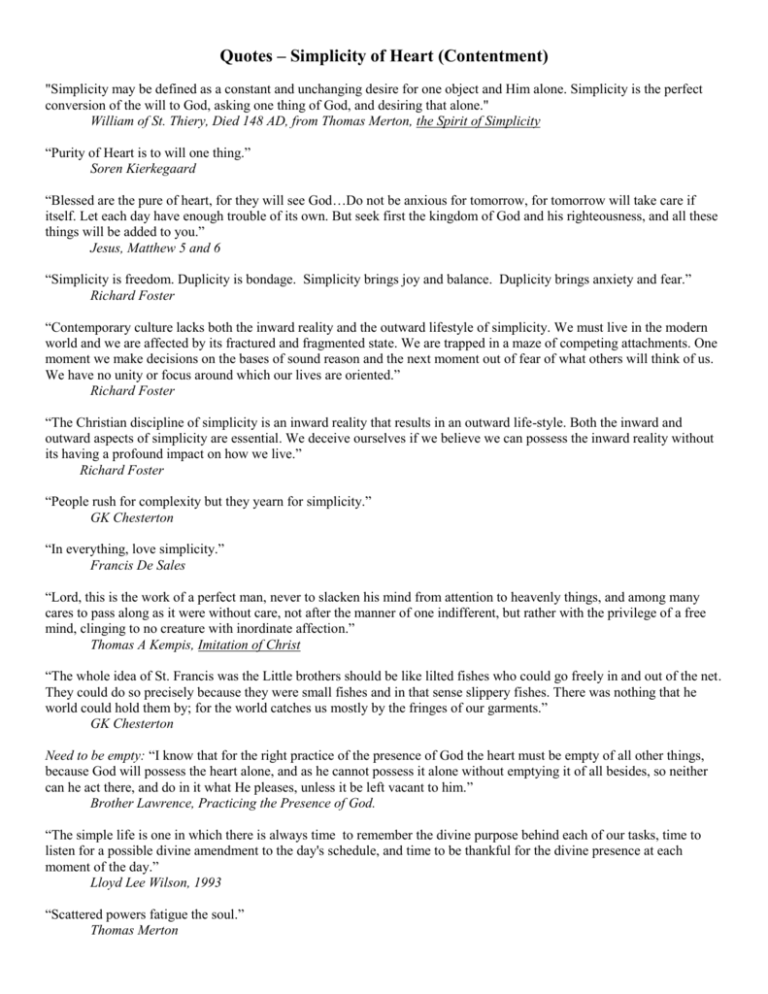
Quotes – Simplicity of Heart (Contentment) "Simplicity may be defined as a constant and unchanging desire for one object and Him alone. Simplicity is the perfect conversion of the will to God, asking one thing of God, and desiring that alone." William of St. Thiery, Died 148 AD, from Thomas Merton, the Spirit of Simplicity “Purity of Heart is to will one thing.” Soren Kierkegaard “Blessed are the pure of heart, for they will see God…Do not be anxious for tomorrow, for tomorrow will take care if itself. Let each day have enough trouble of its own. But seek first the kingdom of God and his righteousness, and all these things will be added to you.” Jesus, Matthew 5 and 6 “Simplicity is freedom. Duplicity is bondage. Simplicity brings joy and balance. Duplicity brings anxiety and fear.” Richard Foster “Contemporary culture lacks both the inward reality and the outward lifestyle of simplicity. We must live in the modern world and we are affected by its fractured and fragmented state. We are trapped in a maze of competing attachments. One moment we make decisions on the bases of sound reason and the next moment out of fear of what others will think of us. We have no unity or focus around which our lives are oriented.” Richard Foster “The Christian discipline of simplicity is an inward reality that results in an outward life-style. Both the inward and outward aspects of simplicity are essential. We deceive ourselves if we believe we can possess the inward reality without its having a profound impact on how we live.” Richard Foster “People rush for complexity but they yearn for simplicity.” GK Chesterton “In everything, love simplicity.” Francis De Sales “Lord, this is the work of a perfect man, never to slacken his mind from attention to heavenly things, and among many cares to pass along as it were without care, not after the manner of one indifferent, but rather with the privilege of a free mind, clinging to no creature with inordinate affection.” Thomas A Kempis, Imitation of Christ “The whole idea of St. Francis was the Little brothers should be like lilted fishes who could go freely in and out of the net. They could do so precisely because they were small fishes and in that sense slippery fishes. There was nothing that he world could hold them by; for the world catches us mostly by the fringes of our garments.” GK Chesterton Need to be empty: “I know that for the right practice of the presence of God the heart must be empty of all other things, because God will possess the heart alone, and as he cannot possess it alone without emptying it of all besides, so neither can he act there, and do in it what He pleases, unless it be left vacant to him.” Brother Lawrence, Practicing the Presence of God. “The simple life is one in which there is always time to remember the divine purpose behind each of our tasks, time to listen for a possible divine amendment to the day's schedule, and time to be thankful for the divine presence at each moment of the day.” Lloyd Lee Wilson, 1993 “Scattered powers fatigue the soul.” Thomas Merton “This state of entire resignation and perpetual acquiescence produces true liberty, and this liberty brings perfect simplicity…(Simplicity’s) peace, amid whatever troubles beset it, will be as boundless as the depths of the sea.” Francois Fenelon, Spiritual Letters, p. 218 “I beseech Thee, my most merciful Lord God, preserve me from the cares of this life, lest I become too much entangled; from many necessities of the body, lest I be taken captive by pleasure; from all the obstacles of the spirit, lest I be broken down with cares…and cannot enter liberty of spirit...” Thomas A Kempis, Imitation of Christ, 3:26: 2 “Even the necessary obligations that we feel we must meet grow overnight, like Jack’s beanstalk, and before we know it we are bowed down with burdens, crushed under committees, strained, breathless, and hurried, panting through a neverending program of appointments. We are too busy to be good wives to our husbands, good homemakers, good companions for our children, good friends to our friends, and with no time at all to be friends of the friendless. … And in frantic fidelity we try to meet at least the necessary minimum of calls upon us. But we’re weary and breathless. We are giving a false explanation of the complexity of our lives. We blame it upon the complex environment. Our complex living, we say, is due to the complex world we live in, with its radios and autos, which give us more stimulation per square hour than used to be given per square day to our grandmothers. (Kelly lived at a time when people were made weary and breathless by stimulation coming from radios and autos. He never could have imagined the enormously more complex world that we inhabit today). We Western people are apt to think our great problems are external, environmental. We are however not skilled in the inner life, where the real roots of our problem lie. For I would suggest that the true explanation of the complexity of our program is an inner one, not an outer one.” “Breathless” by Thomas Kelly from A Testament of Devotion, 1940’s “In essence, there is only one thing God asks of us – that we be men and women of prayer, people who live close to God, people for whom God is everything and for whom God is enough. That is the root of peace. We have that peace when the gracious God is all we seek. When we start seeking something besides him, we lose it. As Merton said in the last public address before his death, ‘That is his call to us – simply to be people who are content to live close to him and to renew the kind of life in which the closeness is felt and experienced.’ ” Brennan Manning, “Ragamuffin Gospel” – (p. 44) “Give me a place to stand, and I will move the earth.” Archimedes “The child is, indeed, in (simplicity) and many other matters, the best guide. And in nothing is the child so righteously childlike, in nothing does he exhibit more accurately the sounder order of simplicity, than in the fact the he sees everything with a simple pleasure, even the complex things.” GK Chesterton. “The love of worldly possessions is a sort of bird line, which entangles the soul and prevents it flying to God.” St. Augustine “For the one who has become close to God, all is one. Only God counts, and in God all people and all things are embraced with love. To live in the presence of God is to live with purity of heart, with simplemindedness and with total acceptance of his will. That indeed, demands a choice, a decision and great courage, It is a sign of true holiness.” Henry Nouwen, Genesee Diary, p. 152 “Do not be anxious about what you have but about what you are.” Saint Gregory the Great “If one has Christ in their heart, heaven before their eyes, and only as much temporal blessing as is needful to carry them safely through life, then pain and sorrow have little to shoot at.” Hudson Taylor, Missionary to China, 19th Century. “When we are truly in this interior simplicity, our whole appearance is franker, more natural. This true simplicity makes us conscious of a certain openness, gentleness, innocence, gaiety, and serenity, which is charming when we see it …continually, with pure eyes. O how amiable this simplicity is! Who will give it to me? I leave all for this. It is the Pearl of the gospel.” Francois Fenelon “In the case of Lao Tzu, the keynote of his tao-te ching (a Classic of the Way and Its Virtue) is “simplicity,” a central idea by which other apparently strange concepts must be understood. A “simple” life is a life of plainness, in which profit is discarded, cleverness abandoned, selfishness minimized, and desires reduced. It is the life of “perfection which seems to be incomplete” of “fullness which seems to be empty,” of “absolute straightness which seems to be crooked,” of “skill which seems to be clumsy,” and of “eloquence which seems to stutter.” It is the life of “producing and rearing things without taking possession of them,” and of “leading things buy not dominating them.” It is the life which is “as pointed as a square but does not pierce, as acute as a knife but does not cut, as straight as an unbent line but does not extend, and as bright as light but does not dazzle.” The Chinese Mind, by Charles A. Moore, p. 39 “The only simplicity that matters is the simplicity of the heart. If that be gone, it can be brought back by no turnips or cellular clothing; but only by tears and terror and the fires that are not quenched. If that remain, it matters very little if a few Early Victorian armchairs remain along with it. Let us put a complex entrée into a complex old gentleman. So long as human society will leave my spiritual inside alone, I will allow it, with a comparative submission, to work its wild will with my physical interior. I will submit to cigars. I will meekly embrace a bottle of Burgundy. I will humble myself to a hansom cab. If only by this means I may preserve to myself the virginity of the spirit, which enjoys with astonishment and fear. I do not say that these are the only methods of preserving it. I incline to the belief that there are others. But I will have nothing to do with simplicity which lacks the fear, the astonishment, and the joy alike. I will have nothing to do with the devilish vision of a child who is too simple to like toys. The child is, indeed, in these, and many other matters, the best guide. And in nothing is the child so righteously childlike, in nothing does he exhibit more accurately the sounder order of simplicity, than in the fact that he sees everything with a simple pleasure, even the complex things. The false type of naturalness harps always on the distinction between the natural and the artificial. The higher kind of naturalness ignores that distinction. To the child the tree and the lamp-post are as natural and as artificial as each other; or rather, neither of them are natural but both supernatural. For both are splendid and unexplained. The flower with which God crowns the one, and the flame with which Sam the lamplighter crowns the other, are equally of the gold of fairy-tails. In the middle of the wildest fields the most rustic child is, ten to one, playing at steam-engines. And the only spiritual or philosophical objection to steam-engines is not that men pay for them or work at them, or make them very ugly, or even that men are killed by them; but merely that men do not play at them. The evil is that the childish poetry of clockwork does not remain. The wrong is not that engines are too much admired, but that they are not admired enough. The sin is not that engines are mechanical, but that men are mechanical.” Gilbert K. Chesterton, Heretics (p. 140-141) “When the solution is simple, God is answering.” Albert Einstein “Perfection is achieved not when there is nothing more to add but when there is nothing left to take away.” Antoine de Saint Exupery “Lord, this is the work of a perfect man, never to slacken his mind from attention to heavenly things, and among many cares to pass along as it were without care, not after the manner of one indifferent, but rather with the privilege of a free mind, clinging to no creature with inordinate affection.” Thomas A Kempis, Imitation of Christ, 3:26:1 “(Simplicity’s) peace, amid whatever troubles beset it, will be as boundless as the depths of the sea.” Francois Fenelon, Spiritual Letters. p. 218 Some say that my teaching is nonsense. Others call it lofty or impractical. But to those who have looked inside themselves, This nonsense makes perfect sense. And to those who put it into practice, This loftiness has roots that go deep. I have just three things to teach: Simplicity, patience, compassion. These three are your greatest treasures. Simple in actions and in thoughts, You return to the source of being. Patient with both friends and enemies, You accord with the way things are. Compassionate toward yourself, you reconcile all beings in the world. Lao-Tzu (6th Century BCE), Tao Te Ching Fill your bowl to the brim and it will spill. Keep sharpening your knife and it will blunt. Chase after money and security and your heart will never unclench. Care about people's approval and you will be their prisoner. Lao Tze, Tao Te Ching If you realize that you have enough, you are truly rich. If you stay in the center and embrace death with your whole heart, you will endure forever. Lao Tze, Tao Te Ching “Simplicity is the ultimate sophistication.” Leonardo da Vinci “Blessed is he that expects nothing, for he shall never be disappointed.” Benjamin Franklin, Wit and Wisdom He that’s content hath enough. He that complains has too much. Benjamin Franklin, Wit and Wisdom The relative perfection which we must attain to in this life if we are to live as sons of God is not the twenty-four-hour-aday production of perfect acts of virtue, but a life from which practically all the obstacles to God’s love have been removed or overcome. Happiness consists of finding out precisely what the “one thing necessary” may be, in our lives, and in gladly relinquishing all the rest. For then, by a divine paradox we find that everything else is given us together with the one thing we needed. No Man is an Island, by Thomas Merton, pp. 129m to 130 If I am content with little; enough is as good as a feast. Isaac Bickerstaff
